三大从句的翻译与特殊句型
- 格式:ppt
- 大小:525.50 KB
- 文档页数:30

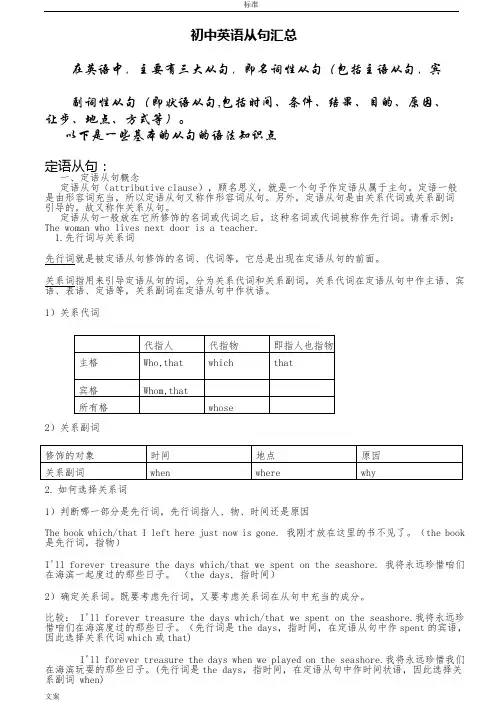
初中英语从句汇总在英语中,主要有三大从句,即名词性从句(包括主语从句,宾副词性从句(即状语从句,包括时间、条件、结果、目的、原因、让步、地点、方式等)。
以下是一些基本的从句的语法知识点定语从句:一、定语从句概念定语从句(attributive clause),顾名思义,就是一个句子作定语从属于主句。
定语一般是由形容词充当,所以定语从句又称作形容词从句。
另外,定语从句是由关系代词或关系副词引导的,故又称作关系从句。
定语从句一般放在它所修饰的名词或代词之后,这种名词或代词被称作先行词。
请看示例:The woman who lives next door is a teacher.1.先行词与关系词先行词就是被定语从句修饰的名词、代词等,它总是出现在定语从句的前面。
关系词指用来引导定语从句的词,分为关系代词和关系副词,关系代词在定语从句中作主语、宾语、表语、定语等,关系副词在定语从句中作状语。
1)关系代词2)关系副词1)判断哪一部分是先行词,先行词指人、物、时间还是原因The book which/that I left here just now is gone. 我刚才放在这里的书不见了。
(the book 是先行词,指物)I'll forever treasure the days which/that we spent on the seashore. 我将永远珍惜咱们在海滨一起度过的那些日子。
(the days, 指时间)2)确定关系词。
既要考虑先行词,又要考虑关系词在从句中充当的成分。
比较: I'll forever treasure the days which/that we spent on the seashore.我将永远珍惜咱们在海滨度过的那些日子。
(先行词是the days,指时间,在定语从句中作spent的宾语,因此选择关系代词which或that)I'll forever treasure the days when we played on the seashore.我将永远珍惜我们在海滨玩耍的那些日子。
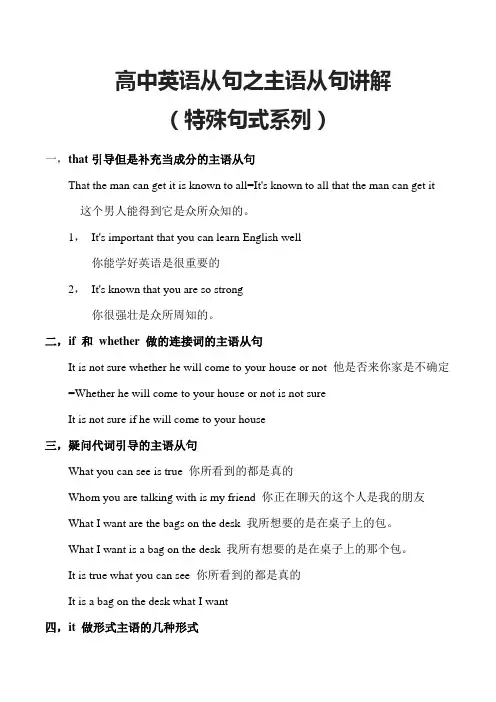
高中英语从句之主语从句讲解(特殊句式系列)一,that引导但是补充当成分的主语从句That the man can get it is known to all=It's known to all that the man can get it 这个男人能得到它是众所众知的。
1,It's important that you can learn English well你能学好英语是很重要的2,It's known that you are so strong你很强壮是众所周知的。
二,if 和whether 做的连接词的主语从句It is not sure whether he will come to your house or not 他是否来你家是不确定=Whether he will come to your house or not is not sureIt is not sure if he will come to your house三,疑问代词引导的主语从句What you can see is true 你所看到的都是真的Whom you are talking with is my friend 你正在聊天的这个人是我的朋友What I want are the bags on the desk 我所想要的是在桌子上的包。
What I want is a bag on the desk 我所有想要的是在桌子上的那个包。
It is true what you can see 你所看到的都是真的It is a bag on the desk what I want四,it 做形式主语的几种形式1,常用形容词:Certain 明确的,clear 清晰的,important重要的,natural自然的,necessary 必要的,obvious明显的,unbelievable 难以置信的,strange 奇怪的,unlikely不可能的,right 正确It is unlikely that you can lift the big stone 你能举起这个大石头是不可能的。
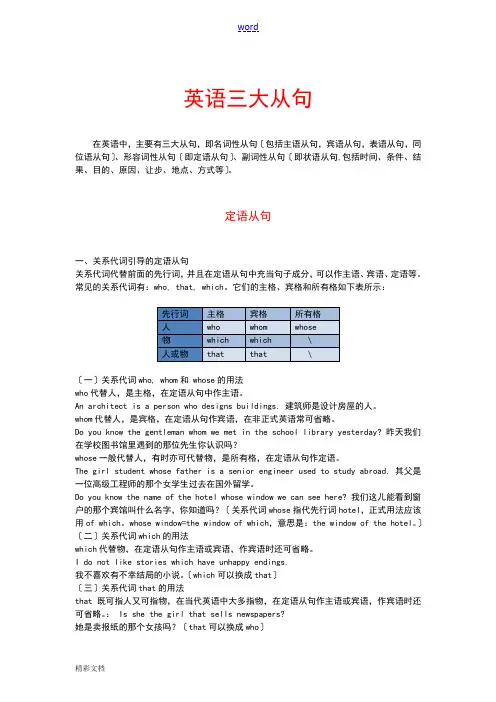
英语三大从句在英语中,主要有三大从句,即名词性从句〔包括主语从句,宾语从句,表语从句,同位语从句〕、形容词性从句〔即定语从句〕、副词性从句〔即状语从句,包括时间、条件、结果、目的、原因、让步、地点、方式等〕。
定语从句一、关系代词引导的定语从句关系代词代替前面的先行词,并且在定语从句中充当句子成分,可以作主语、宾语、定语等。
常见的关系代词有:who, that, which。
它们的主格、宾格和所有格如下表所示:〔一〕关系代词who, whom和 whose的用法who代替人,是主格,在定语从句中作主语。
An architect is a person who designs buildings. 建筑师是设计房屋的人。
whom代替人,是宾格,在定语从句作宾语,在非正式英语常可省略。
Do you know the gentleman whom we met in the school library yesterday? 昨天我们在学校图书馆里遇到的那位先生你认识吗?whose一般代替人,有时亦可代替物,是所有格,在定语从句作定语。
The girl student whose father is a senior engineer used to study abroad. 其父是一位高级工程师的那个女学生过去在国外留学。
Do you know the name of the hotel whose window we can see here? 我们这儿能看到窗户的那个宾馆叫什么名字,你知道吗?〔关系代词whose指代先行词hotel,正式用法应该用of which。
whose window=the window of which,意思是:the window of the hotel。
〕〔二〕关系代词which的用法which代替物,在定语从句作主语或宾语,作宾语时还可省略。
I do not like stories which have unhappy endings.我不喜欢有不幸结局的小说。
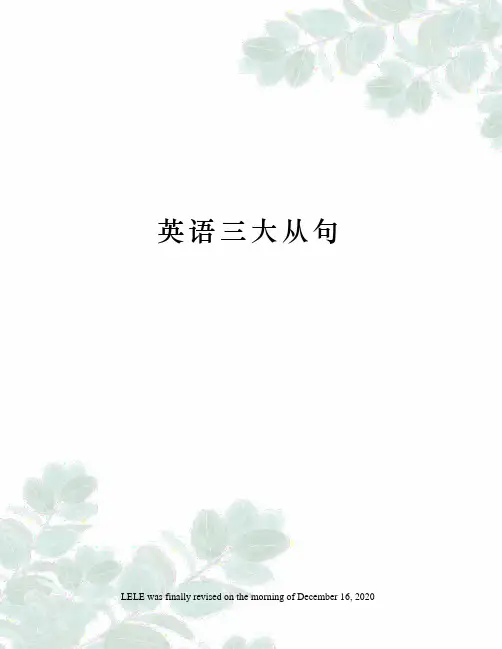
英语三大从句LELE was finally revised on the morning of December 16, 2020复合句【语法要点】复合句是由一个主句加一个或几个从句所构成的句子。
从句只用作句子的一个成分,不能独立。
根据从句在句子中的作用,可分为名词性从句、定语从句和状语从句三类。
(一)名词性从句名词性从句包括主语从句、表语从句、宾语从句、同位语从句。
其关联词有连接词that、if、whether;疑问代词who、what、which和疑问副词when、where、how、why等。
1)if不能引导表语从句。
连接代词who、what、whose、which不能引导同位语从句。
2)有时as、as if/though、because也可以引导表语从句,能跟表语从句的谓语动词一般为系动词be、seem、look等。
例如:Things are not always as they seem to be.事情并不总是像表面上看来的那样。
It looks as if it were going to rain. It is because you eat too much.3)介词宾语不可以用which来引导,而要用what来引导。
例如:We can learn what we did not know. He will talk to us about what he saw in the .4)连词that引导的名词性从句除能用在except、but、in后之外很少作介词的宾语,。
其它一些介词的宾语从句如果由连词that引导,则需用it先行一步作形式宾语。
例如:He is a good student except that he is careless.You may depend on it that they will support you.5)若主句谓语动词是及物动词make、find、think、see、hear等,则把宾语从句置于宾语补足语之后,用it作形式宾语。
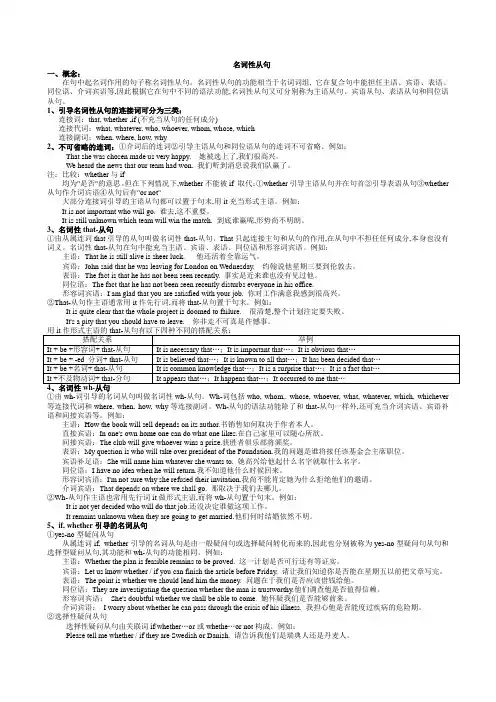
名词性从句一、概念:在句中起名词作用的句子称名词性从句。
名词性从句的功能相当于名词词组, 它在复合句中能担任主语、宾语、表语、同位语、介词宾语等,因此根据它在句中不同的语法功能,名词性从句又可分别称为主语从句、宾语从句、表语从句和同位语从句。
1、引导名词性从句的连接词可分为三类:连接词:that, whether ,if (不充当从句的任何成分)连接代词:what, whatever, who, whoever, whom, whose, which连接副词:when, where, how, why2、不可省略的连词:①介词后的连词②引导主语从句和同位语从句的连词不可省略。
例如:That she was chosen made us very happy. 她被选上了,我们很高兴。
We heard the news that our team had won. 我们听到消息说我们队赢了。
注:比较:whether与if均为"是否"的意思。
但在下列情况下,whether不能被if 取代:①whether引导主语从句并在句首②引导表语从句③whether 从句作介词宾语④从句后有"or not"大部分连接词引导的主语从句都可以置于句末,用it充当形式主语。
例如:It is not important who will go. 谁去,这不重要。
It is still unknown which team will win the match. 到底谁赢呢,形势尚不明朗。
3、名词性that-从句①由从属连词that引导的从句叫做名词性that-从句。
That只起连接主句和从句的作用,在从句中不担任任何成分,本身也没有词义。
名词性that-从句在句中能充当主语、宾语、表语、同位语和形容词宾语。
例如:主语:That he is still alive is sheer luck.他还活着全靠运气。
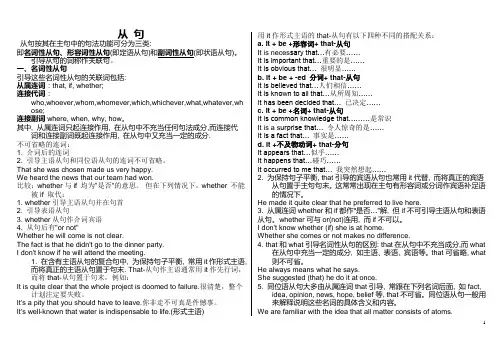
从句从句按其在主句中的句法功能可分为三类:即名词性从句、形容词性从句(即定语从句)和副词性从句(即状语从句)。
引导从句的词称作关联句。
一、名词性从句引导这些名词性从句的关联词包括:从属连词:that, if, whether;连接代词:who,whoever,whom,whomever,which,whichever,what,whatever,wh ose;连接副词where, when, why, how。
其中, 从属连词只起连接作用, 在从句中不充当任何句法成分,而连接代词和连接副词既起连接作用, 在从句中又充当一定的成分.不可省略的连词:1. 介词后的连词2. 引导主语从句和同位语从句的连词不可省略。
That she was chosen made us very happy.We heard the news that our team had won.比较:whether与if 均为"是否"的意思。
但在下列情况下,whether 不能被if 取代:1. whether引导主语从句并在句首2. 引导表语从句3. whether从句作介词宾语4. 从句后有"or not"Whether he will come is not clear.The fact is that he didn't go to the dinner party.I don't know if he will attend the meeting.1. 在含有主语从句的复合句中, 为保持句子平衡, 常用it作形式主语,而将真正的主语从句置于句末. That-从句作主语通常用it作先行词,而将that-从句置于句末,例如:It is quite clear that the whole project is doomed to failure.很清楚,整个计划注定要失败。

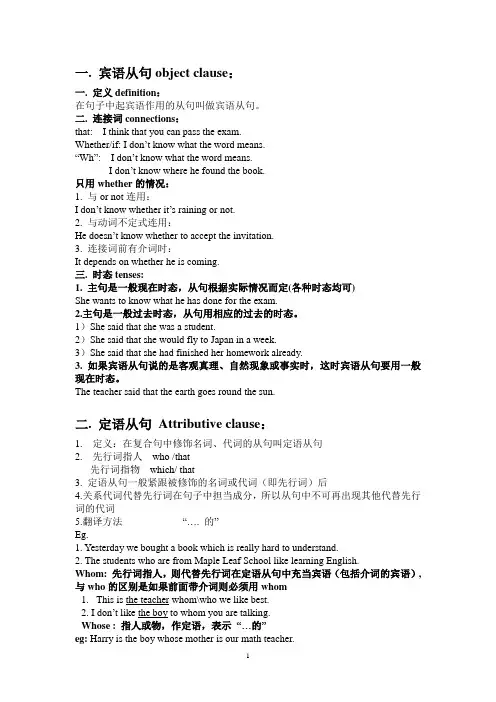
一. 宾语从句object clause:一. 定义definition:在句子中起宾语作用的从句叫做宾语从句。
二. 连接词connections:that: I think that you can pass the exam.Whether/if: I don’t know what the word means.“Wh”: I don’t know what the word means.I don’t know where he found the book.只用whether的情况:1. 与or not连用:I don’t know whether it’s raining or not.2. 与动词不定式连用:He doesn’t know whether to accept the invitation.3. 连接词前有介词时:It depends on whether he is coming.三. 时态tenses:1. 主句是一般现在时态,从句根据实际情况而定(各种时态均可)She wants to know what he has done for the exam.2.主句是一般过去时态,从句用相应的过去的时态。
1)She said that she was a student.2)She said that she would fly to Japan in a week.3)She said that she had finished her homework already.3. 如果宾语从句说的是客观真理、自然现象或事实时,这时宾语从句要用一般现在时态。
The teacher said that the earth goes round the sun.二. 定语从句Attributive clause:1.定义:在复合句中修饰名词、代词的从句叫定语从句2.先行词指人who /that先行词指物which/ that3. 定语从句一般紧跟被修饰的名词或代词(即先行词)后4.关系代词代替先行词在句子中担当成分,所以从句中不可再出现其他代替先行词的代词5.翻译方法“…. 的”Eg.1. Yesterday we bought a book which is really hard to understand.2. The students who are from Maple Leaf School like learning English.Whom: 先行词指人,则代替先行词在定语从句中充当宾语(包括介词的宾语), 与who的区别是如果前面带介词则必须用whom1.This is the teacher whom\who we like best.2. I don’t like the boy to whom you are talking.Whose : 指人或物,作定语,表示“…的”eg: Harry is the boy whose mother is our math teacher.关系代词只能that 的特殊情况:1.先行词前有序数词修饰时:This is the first gift that my parents bought me.2.先行词前有形容词最高级修饰时:This is the most exciting film that I have ever seen.3. 先行词是不定代词something, anything等时.e.g. Is there anything that you want in this shop4. 先行词是人和物时, 用that.e.g. He talked about some writers and books that were unknown to us all.5. 先行词被all , little , the only , the very(就是,正是), the last 等词修饰时,只能用thate.g. This is the last place that I want to visit.6. 特殊疑问句以who 或which 开头,只能用that引导.Who is the girl that is making a speech on the platform?当关系代词前使用介词时:物+介词+which ; 人+ 介词+ whom当关系代词前使用介词时:e.g. 1. This is the train by which we went to Beijing.2. This is the teacher to whom my mother is talking.三. 状语从句:Adverbial clauses定义:在复合句中由从句表示的状语称作状语从句,它可以用来修饰谓语(包括非谓语动词)、定语或状语,或是整个句子。
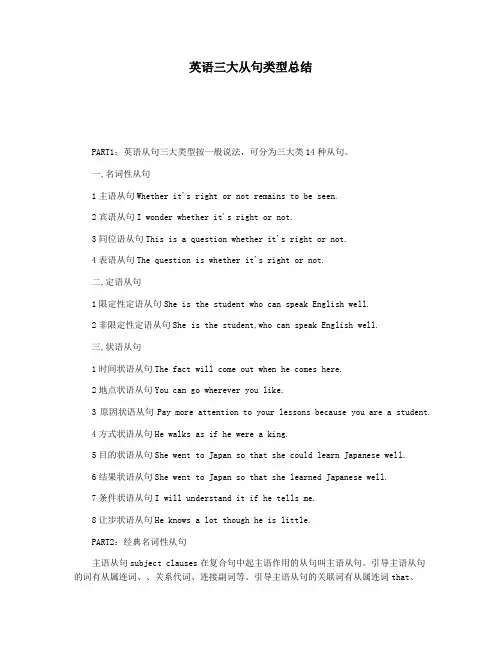
英语三大从句类型总结PART1:英语从句三大类型按一般说法,可分为三大类14种从句。
一,名词性从句1主语从句Whether it's right or not remains to be seen.2宾语从句I wonder whether it's right or not.3同位语从句This is a question whether it's right or not.4表语从句The question is whether it's right or not.二,定语从句1限定性定语从句She is the student who can speak English well.2非限定性定语从句She is the student,who can speak English well.三,状语从句1时间状语从句The fact will come out when he comes here.2地点状语从句You can go wherever you like.3原因状语从句Pay more attention to your lessons because you are a student. 4方式状语从句He walks as if he were a king.5目的状语从句She went to Japan so that she could learn Japanese well.6结果状语从句She went to Japan so that she learned Japanese well.7条件状语从句I will understand it if he tells me.8让步状语从句He knows a lot though he is little.PART2:经典名词性从句主语从句subject clauses在复合句中起主语作用的从句叫主语从句。
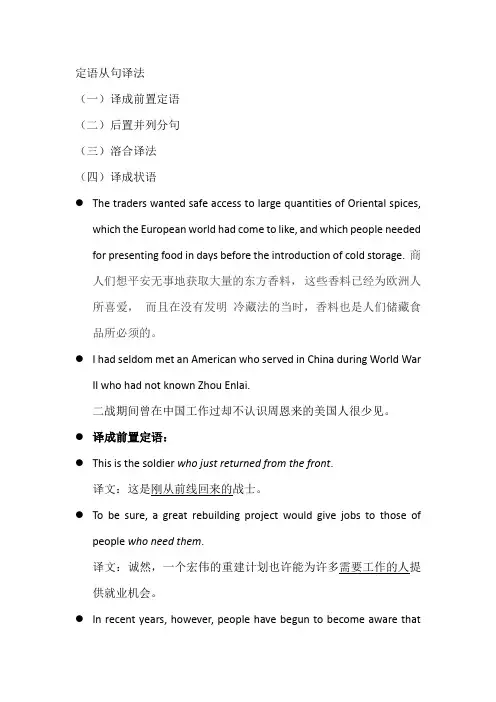
定语从句译法(一)译成前置定语(二)后置并列分句(三)溶合译法(四)译成状语●The traders wanted safe access to large quantities of Oriental spices,which the European world had come to like, and which people needed for presenting food in days before the introduction of cold storage.商人们想平安无事地获取大量的东方香料,这些香料已经为欧洲人所喜爱,而且在没有发明冷藏法的当时,香料也是人们储藏食品所必须的。
●I had seldom met an American who served in China during World WarII who had not known Zhou Enlai.二战期间曾在中国工作过却不认识周恩来的美国人很少见。
●译成前置定语:●This is the soldier who just returned from the front.译文:这是刚从前线回来的战士。
●To be sure, a great rebuilding project would give jobs to those ofpeople who need them.译文:诚然,一个宏伟的重建计划也许能为许多需要工作的人提供就业机会。
●In recent years, however, people have begun to become aware thatcities are also areas where there is a concentration of problems. 可是,近几年来人们开始意识到城市也是问题成堆的地方。
●Chemistry deals with changes in matter as a result of which it ispossible to form a new substance.译文:化学是研究物质变化的,这种变化的结果能够形成新的物质。
一个句子搞定英语的三大从句英语的三大从句是指:名词性从句、形容词性从句和副词性从句名词性从句包括:主语从句、宾语从句、表语从句和同位语从句。
形容词性从句包括:限制性定语从句和非限制性定语从句。
副词性从句包括:时间状语从句、地点状语从句、原因状语从句、条件状语从句、目的状语从句、结果状语从句、让步状语从句、比较状语从句和方式状语从句。
以下用“他考试及格”为例,将它直接或稍作改变用到所有从句中。
1.That he passed the test shocked all his teachers.他本次考试及格了使得他的所有老师感到震惊。
在这句中That he passed the test置于主语位置,故称为“主语从句”。
2. His parents do not know that he passed the test.他的父母不知道他本次考试及格了。
在这句中that he passed the test置于宾语位置,故称为“宾语从句”。
3. He looks happy. The reason is that he passed the test.他看上去很开心,理由是他本次考试及格了。
在这句中that he passed the test置于表语位置,故称为“表语从句”。
4. The fact that he passed the test shocked all his teachers.他本次考及格了这一事实让他的老师感到震惊。
在这句中that he passed the test置于同位语位置,故称为“同位语从句”。
除了用that引导,还可以根据具体的意思不同,用其它引导词引导。
例如:5.How he passed the test is still unknown to me.(主语从句)这次考试他是如何及格的我还不知道。
6. I don't know how he passed the test.(宾语从句)我不知道他这次考试如何及格的。
1、定语从句(形容词从句)2、名词词从句(包括主语从句,宾语从句,表语从句,同位语从句)3、状语从句(副词性从句,包括时间,地点,结果,目的,原因等)一、定语从句:定语从句(Attributive Clauses)在句中做定语,修饰一个名词或代词,被修饰的名词,词组或代词即先行词。
定语从句通常出现在先行词之后,由关系词(关系代词或关系副词)引出。
1、关系代词引导的定语从句关系代词所代替的先行词是人或物的名词或代词,并在从句中充当主语、宾语、定语等成分。
关系代词在定语从句中作主词保持一致。
(1), who, whom, that这些词代替指人,“whom”作宾语指人,“that”既可作主语又可作宾语(作宾语可以省略),可以指人也可以指物。
(2),Which 用来指人或物(用作主语、宾语,作宾语时可以省略)(3),whose“whose”表示谁(可以为人也可以为物)的(东西)2、关系代词引导的定语从句(1),关系副词why主要用于修饰表示原因的名词(主要是the reason),同时它在定语从句中用作原因状语。
(2),关系副词when主要用于修饰表示时间的名词,同时它在定语从句中用作时间状语。
(3),关系副词where主要用于修饰表示地点的名词,同时它在定语从句中用作地点状语。
3、非限制性定语从句它起补充说明作用,缺少也不会影响全句的理解。
在非限制性定语从句的前面往往有逗号隔开。
二、名词性从句在句子中起名词作用的句子叫名词性从句(Noun Clauses)。
名词性从句的功能相当于名词词组, 它在复合句中能担任主语、宾语、表语、同位语、介词宾语等,因此根据它在句中不同的语法功能,名词性从句又可分别称为主语从句、宾语从句、表语从句和同位语从句。
引导名词性从句的连接词可分为三类:1、连词(5个):that (宾语从句或表语从句中that有时可以省略)whether,if (均表示“是否”表明从句内容的不确定性)as if ,as though (均表示“好像”,“似乎”)以上在从句中均不充当任何成分2、连接代词(9个):what, whatever, who, whoever, whom, whomever, whose, which, whichever3、连接副词(7个):when, where, how, why, whenever, wherever, however三、状语从句状语从句(Adverbial Clause)状语从句指句子用作状语时,起副词作用的句子。